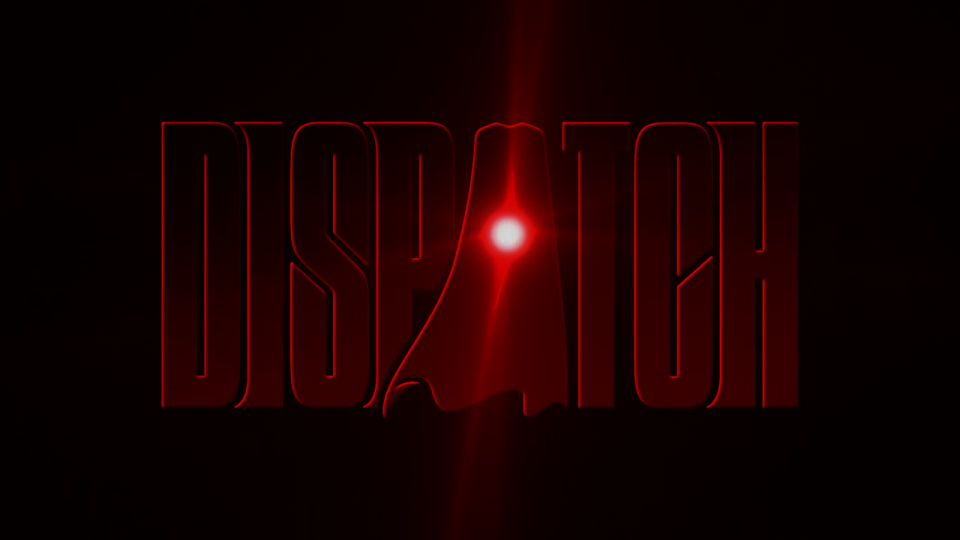Dispatch is an episodic, story-driven superhero adventure from Adhoc Studio that flips the genre on its head by placing you behind the heroes instead of in the suit. You play as Robert Robertson, a former superhero known as Mecha Man. He has no powers and relies on an advanced mechanized suit to stand alongside aliens, mutants, and monsters. After a career-ending incident pulls him out of the field, Robert finds himself at the Superhero Dispatch Network (SDN), where he works as a dispatcher overseeing a dysfunctional team known as the Z-Team: a group of former villains attempting to reform into legitimate superheroes.
Dispatch blends a heartfelt, choice-driven narrative with impressively raunchy but authentic writing, surprisingly engaging strategic gameplay, a striking art direction, a memorable soundtrack, and a phenomenal cast of characters that live with you long past the final credits. After the ball gets rolling, every episode exceeds the last, never dropping the ball on any front. Outside of a few nitpicks with the narrative and choices not feeling as varied and impactful as a Quantic Dreams game, I can easily say that this is at the pinnacle of the genre and is near flawless.
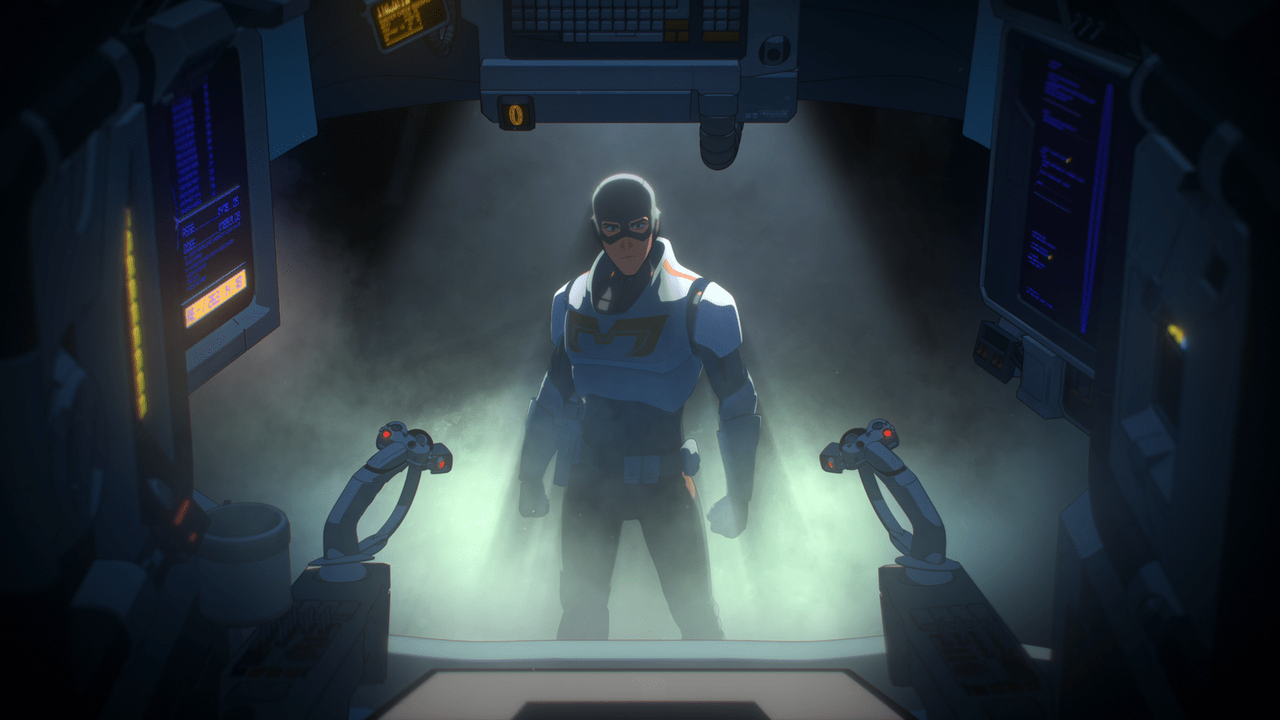
The eight-episode adventure revolves around themes of redemption and second chances—not just for its characters, but in a way that mirrors the story of Adhoc Studio itself. Formed by veterans of Telltale Games and Night School Studio, the team delivers a debut that feels personal, confident, and earned. Dispatch is a clear labor of love, crafted with care, ambition, and heart. It’s a game I can wholeheartedly recommend to almost any type of player, and one of the best and most surprising releases of 2025.
Developer & Publisher: Adhoc Studio
Platforms: PC, PlayStation
MSRP & Release Date: $29.99, October 22nd, 2025
Reviewed On: PC
Presentation & Soundtrack — A Perfect Dispatch of Visuals & Vibes
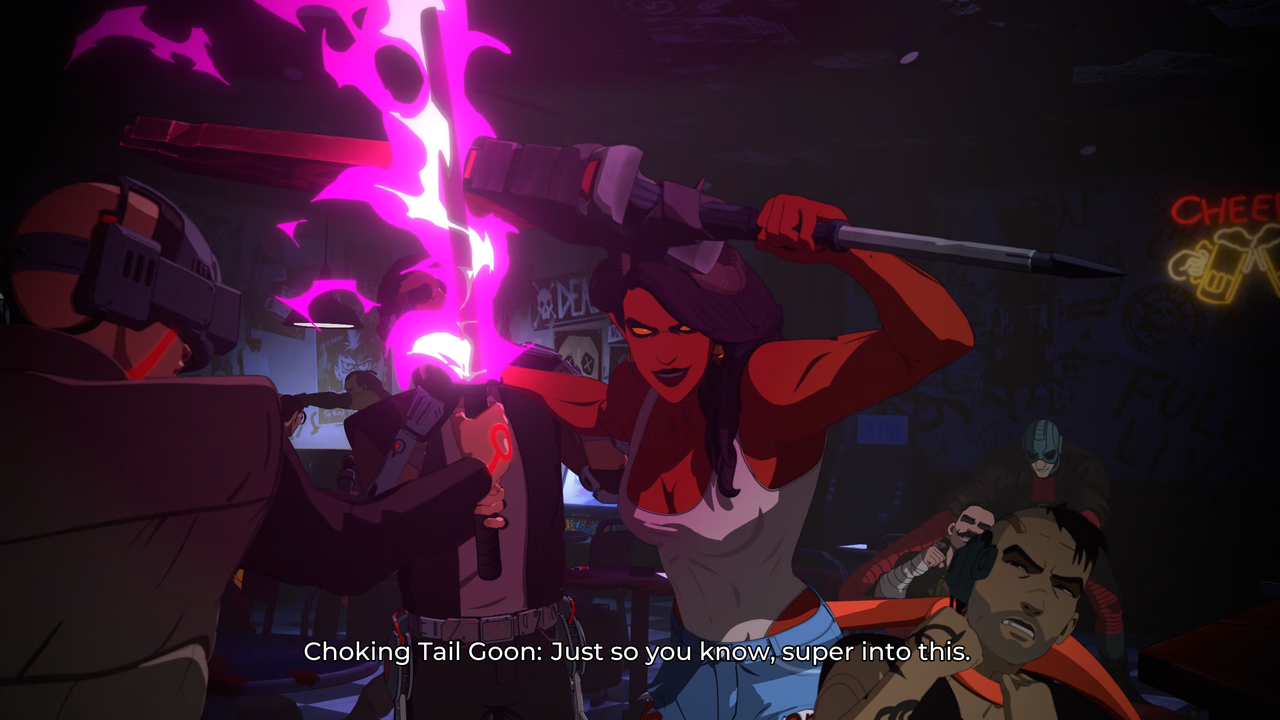
Dispatch is visually striking thanks to its bold, Spider-verse-style presentation, featuring intentionally low-frame-rate character animation and a stylized, comic-inspired look that looks like a graphic novel come to life. It never feels cheap or gimmicky—it feels deliberate, like the game is embracing its identity as a playable animated series rather than chasing realism. The character designs are immaculate, all the way down to the background characters. Adhoc‘s artists did an absolutely amazing job in this regard.
The eclectic and slightly surreal voice cast delivers in spades. With performances from:
- Aaron Paul: Robert Robertson / Mecha Man
- Laura Bailey: Invisigal
- Erin Yvette: Blonde Blazer
- Jeffrey Wright: Chase / Track Star
- Matthew Mercer: Shroud
- Lance Cantstopolis: Flambae
- Mayanna Berrin: Coupé
- Charles White Jr. AKA MoistCr1TiKaL: Sonar
- Alanah Pearce: Malevola
- Seán McLoughlin AKA Jacksepticeye: Punch Up
- THOT SQUAD: Prism
- Yung Gravy: Golem
- Travis Willingham: Phenomaman
- Joel Haver: Waterboy
- Tanoai Reed: Royd
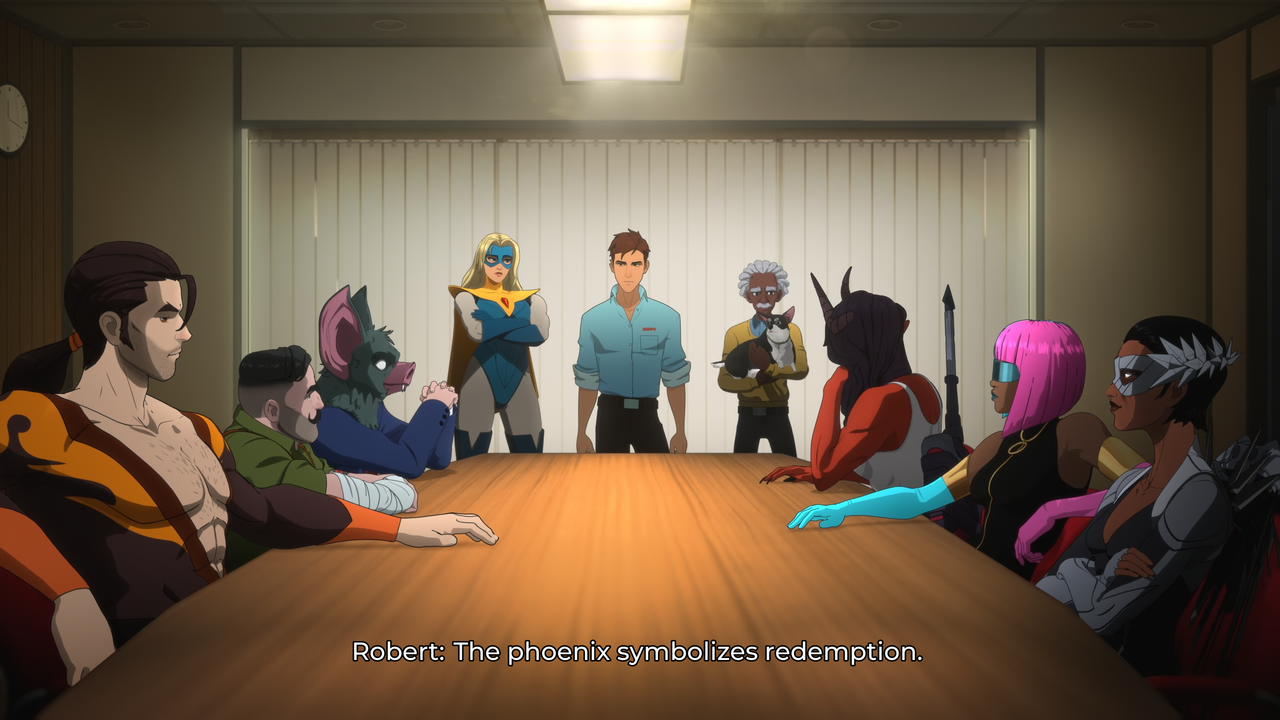
Every line of dialogue brings the characters more and more to life. Whether a moment is heartfelt, awkward, chaotic, or completely unhinged, the performances consistently sell it, making even smaller scenes feel memorable.
Adhoc Studio also makes excellent use of licensed tracks like Radio by Bershy, POUND CAKE and H**S DEPRESSED by THOT SQUAD, and Capsize by Big Black Delta to define the tone of some of the game’s best moments. The music doesn’t just accompany scenes—it elevates them. Pair that with an iconic drunken karaoke sequence, the audio design consistently enhances the experience and almost always hits the mark.
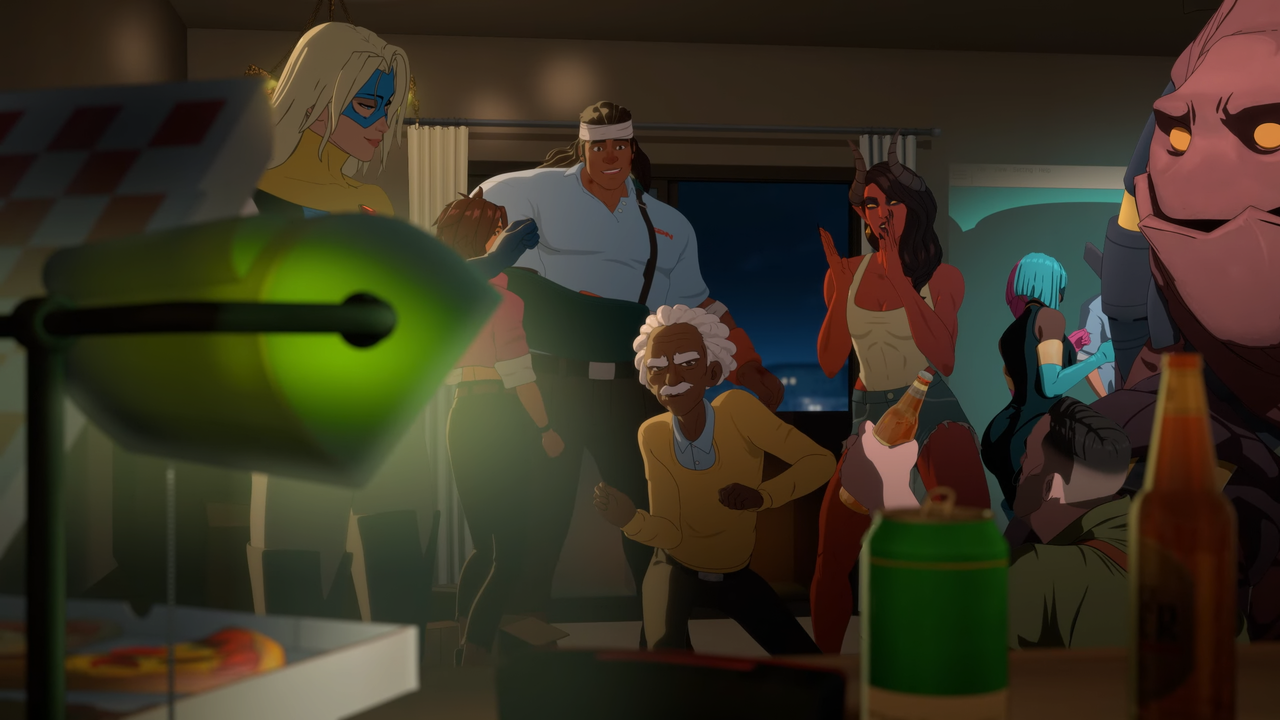
As a fun side note, indie artist Bershy experienced a real-life reflection of the game’s themes. She thought she may never make music again, but after Radio was featured in Episode 6 and gained traction, she’s since credited Dispatch and Adhoc Studio with helping “change her life.”
Characters & Setting — A Super Cast That Will Last
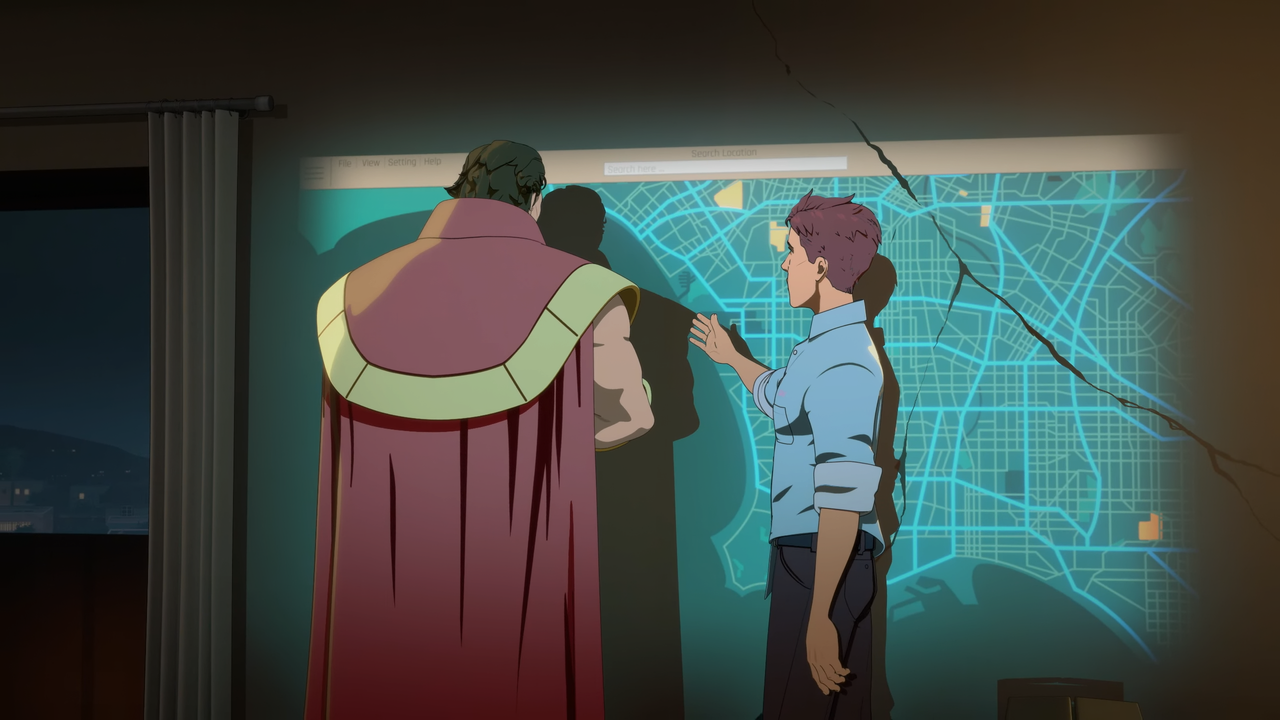
Dispatch takes place in a fictionalized California, largely centered around the Torrance area that Robert and the Z-Team oversee. Instead of a globe-trotting superhero spectacle, the game maintains a small scope, making the world feel more grounded and personal. Where the world truly shines is the characters that inhabit it:
- Robert Robertson / Mecha Man: The sarcastic, brooding former hero who’s mostly powerless without his high-tech suit; now a dispatcher for SDN, still driven by an unyielding desire to do good.
- Invisigal: A foul-mouthed Z-Team member with invisibility powers and deep insecurities about her “villainous” ability; one of Robert’s love interests and a standout for her deep character arc.
- Blonde Blazer: A powerful, level-headed hero who recruits Robert into SDN; warm, grounded, and a beacon of normalcy amid the chaotic cast that surrounds Robert.
- Chase: Robert’s sailor-mouthed confidant and super-speedster whose powers prematurely aged him. Goes way back with Robert and his father. Distrustful of the Z-Team, especially Invisgal.
- Royd: The hulking Hawaiian engineer who balances brains and brawn; He is tasked with fixing the Mecha Man suit and is a steady source of positivity and good vibes
- Phenomaman: SDN’s former poster boy hero who was not born on Earth and doesn’t understand the norms; absurdly powerful, socially awkward, and unintentionally hilarious.
- Waterboy: A socially awkward janitor with bizarre water-barfing powers who adds comedic relief. Can become a Z-Team member.
- The Z-Team: A dysfunctional crew of reformed villains filled with clashing egos and hot-headed personalities who slowly become a real team under Robert’s guidance.
- Shroud: The cold, calculating antagonist responsible for Robert’s father’s death, with near-godlike predictive abilities that make him a perfect foil to Robert.
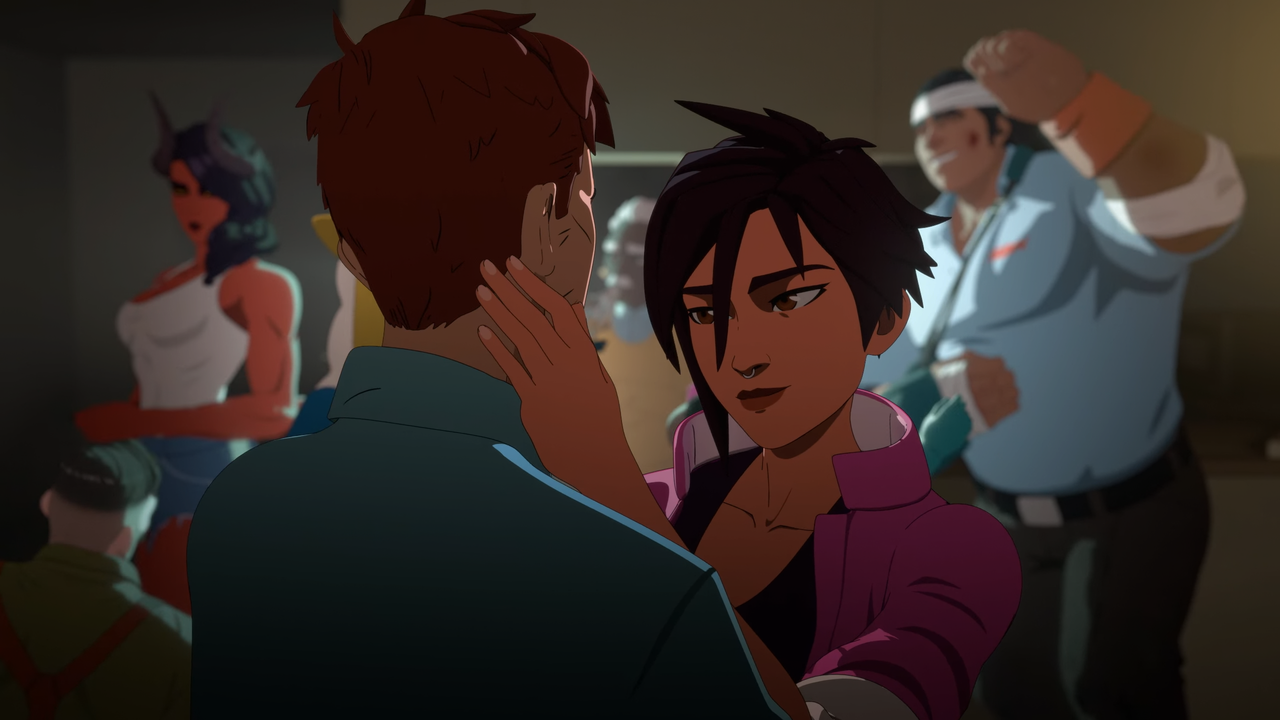
The characters are the heart and soul of Dispatch, and one of the strongest casts I’ve experienced in a video game in years.
Narrative & Writing – Phenomenal!
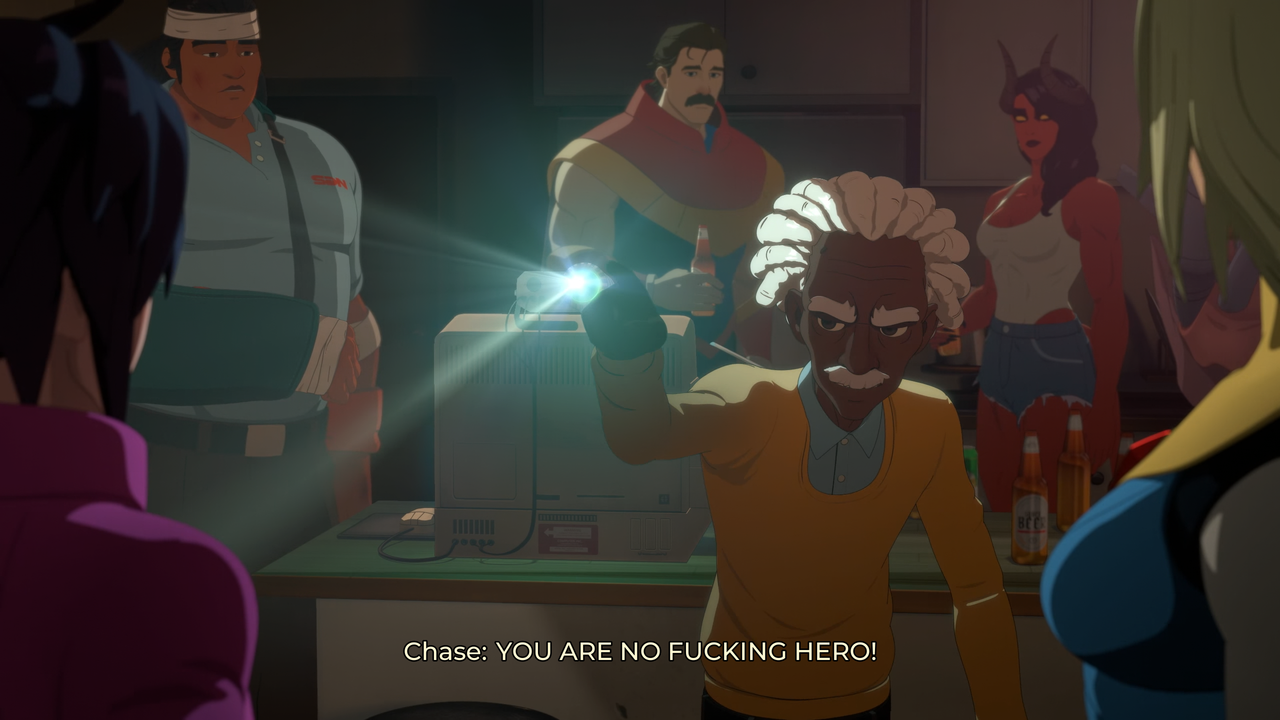
Rather than focusing on traditional superhero spectacle, Dispatch tells a grounded story from the sidelines. After the death of his father, Robert attempts to take revenge on Shroud and the Red Ring, only to lose access to his Mecha Man suit in the process. With no way to repair it and no clear path back to heroism, he’s pulled in by Blonde Blazer with an offer he can’t refuse: work as a dispatcher for SDN, and they’ll provide the resources to restore and maintain his suit. The catch? He’s assigned to the worst team in the division — the Z-Team.
From there, the narrative fires on all cylinders. Each episode is short but meaningful, building tension, relationships, and stakes without ever feeling like filler. Almost every chapter delivers standout moments—from Mecha Man’s opening fight against Toxic (and his flopping genitalia), to Robert’s rallying speech to unify the Z-Team, to the first date with Invisigal or Blonde Blazer, the chaotic bar brawl, the unforgettable party sequence, and eventually the final confrontation with Shroud and the Red Ring. The last episode is a cinematic, action-packed conclusion filled with twists, suspense, and near-perfect emotional payoffs—especially for those who achieve the “good ending.”
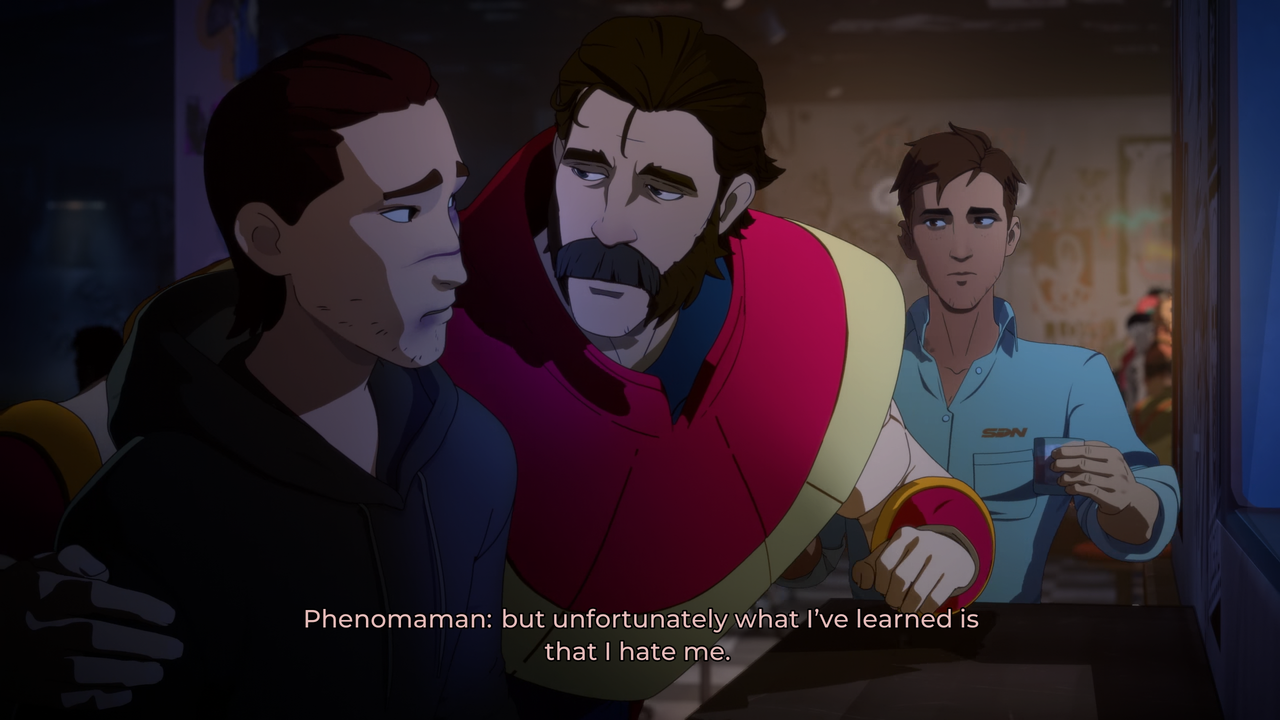
What truly elevates Dispatch, though, is its writing. It’s unapologetically raunchy, packed with profanity, dick jokes, fart jokes, and absurd humor that should feel immature and uncouth on paper. Somehow, Adhoc Studio makes it all work and feel completely natural. The comedy is sharp, often laugh-out-loud funny, yet when the story needs to slow down and hit emotional beats, it never misses.
Few superhero stories balance irreverence and sincerity this well, and even fewer games manage to make both feel earned. It’s ridiculous, heartfelt, and surprisingly human. It’s a combination that sticks with you long after it’s over.
Narrative & Writing (Continued) – Choices & Consequences
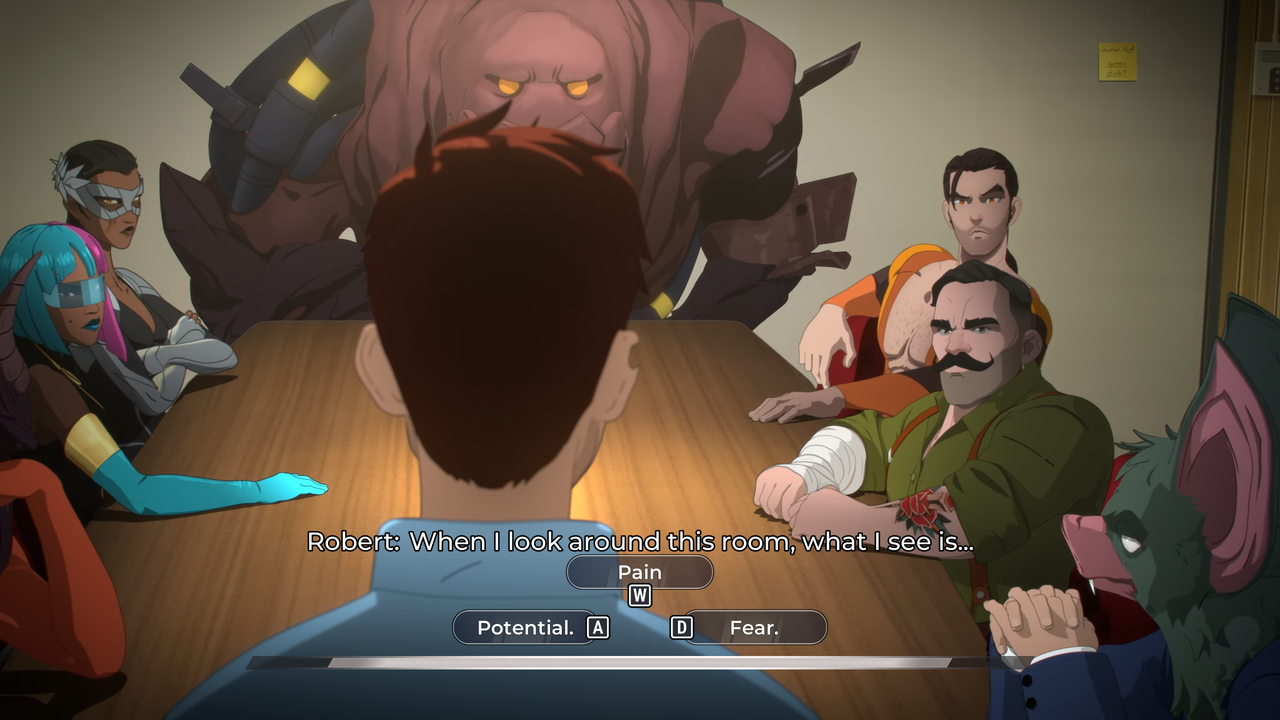
Player choice in Dispatch isn’t about wildly branching paths or rewriting the entire story—it’s about shaping relationships, defining character outcomes, and influencing how the narrative lands. Your dialogue selections and mission decisions directly impact trust, personal arcs, and how certain scenarios play out by the end. While the main narrative structure remains mostly fixed, the context around it shifts depending on how you handle key moments, especially with the Z-Team and the two romance options, Invisigal and Blonde Blazer.
Episodes 7 and 8 bring those choices full circle, with previous decisions coming back in meaningful ways, affecting key scenes, character fates, and even aspects of the final confrontation. That said, outside of swapping certain roles, altering some dialogue and scenes, and changing the emotional direction of the finale, the core narrative still follows a relatively narrow path.
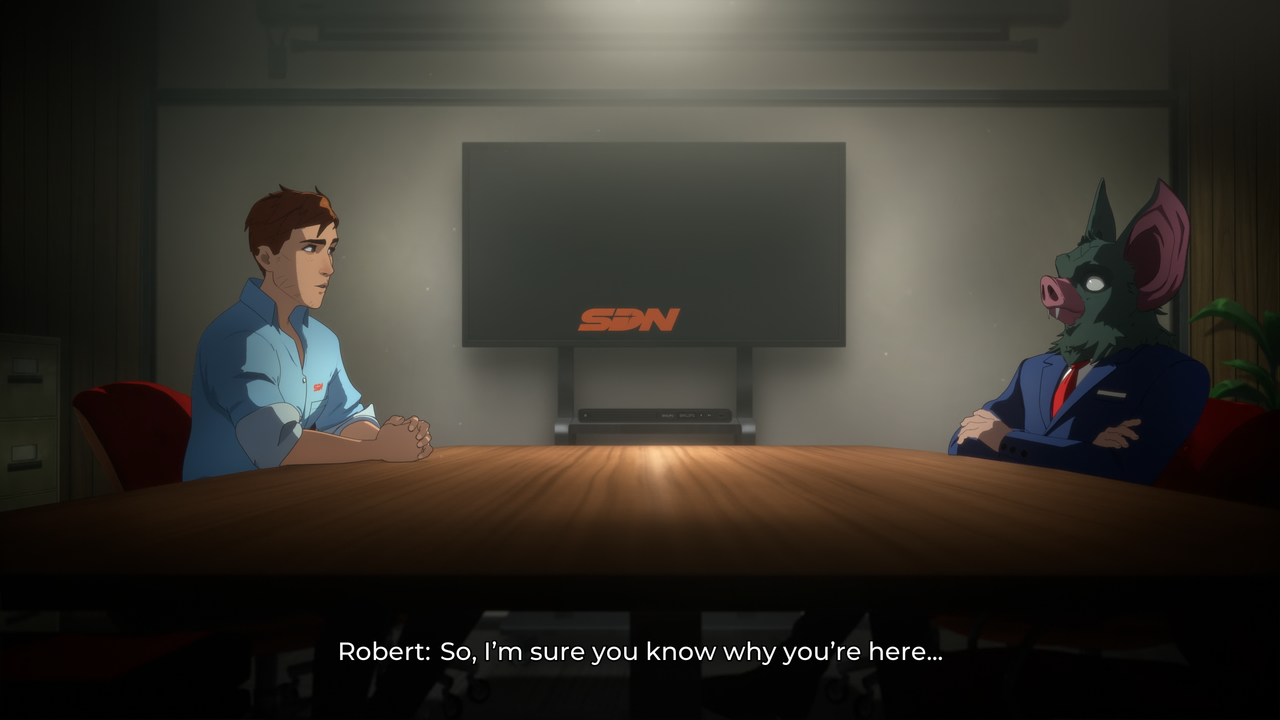
Despite that, the choices never feel pointless. Dispatch doesn’t aim for a dozen wildly different endings—instead, it opts for a more focused, Telltale-style approach where the story itself is the constant, and your decisions shape how it feels and who stands beside you when the credits roll. And it works. The journey remains satisfying regardless of your path, while still making you feel invested in the consequences along the way. My biggest gripe with choices and consequences is Phenomaman’s handling of Blonde Blazer’s romance path. They tease intriguing tension in Episode 2, but it leads absolutely nowhere.
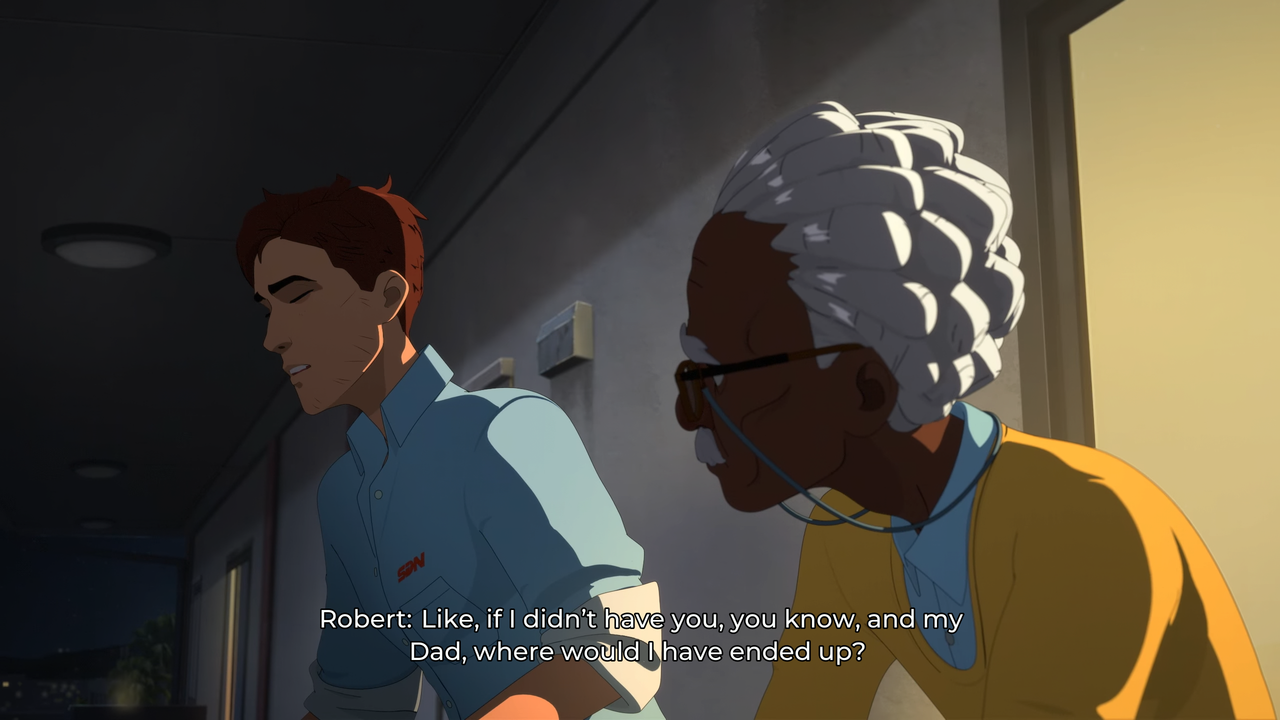
Both the “good” and “bad” endings are absolutely worth seeing, not because they rewrite the entire experience, but because they provide different emotional resolutions to the same core story. It does add a bit of replay value, but even more so, it reinforces what Dispatch does best: making your version of the story feel personal, even within its structured framework.
Gameplay – Dispatch Operations
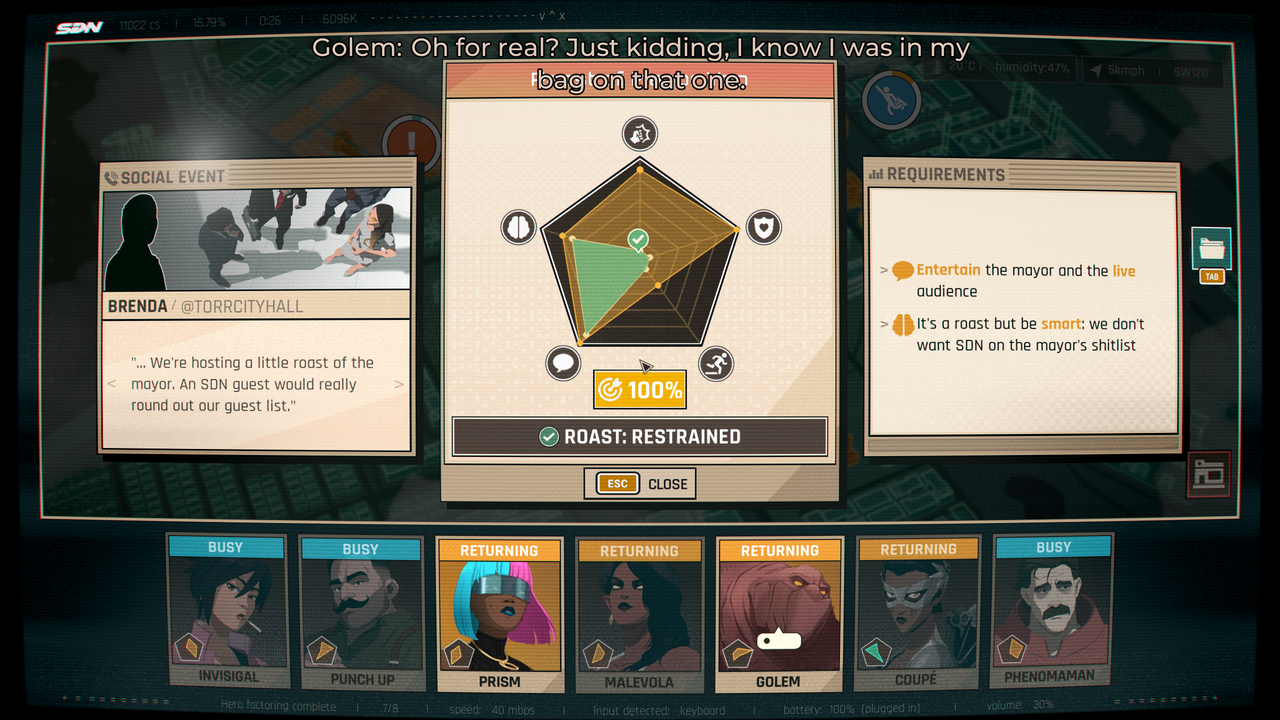
At its core, Dispatch revolves around managing emergencies through a command interface. You assign your Z-Team heroes to active situations, utilizing their skills and figuring out who best fits the needs of the call. Some calls will only need one hero, but they can range all the way up to 4 heroes for a call. When sending a hero, they take time to travel to and from a call (some heroes are faster than others) and take more time to complete the task. Most heroes will resolve the call automatically, but sometimes Robert will be called in to resolve an issue by choosing how to handle the situation.
Hero stats include combat, movement, vigor, charisma, and intellect. These stats determine how well the hero can complete a task. Certain members also have a synergy boost when being dispatched together, such as Sonar and Malevola or Invisigal and Golem. As episodes progress, you gain experience and level up your hero, building them out for certain roles. The gameplay systems also become more demanding, layering in new complications that force you to think strategically about availability, synergies, and stat management. From the Z-Team sabotaging each other to make sure they’re not last on the SDN leaderboard to stat limits that automatically fail you if your heroes have too much of a stat, every new episode shakes things up to keep the gameplay fresh and interesting.
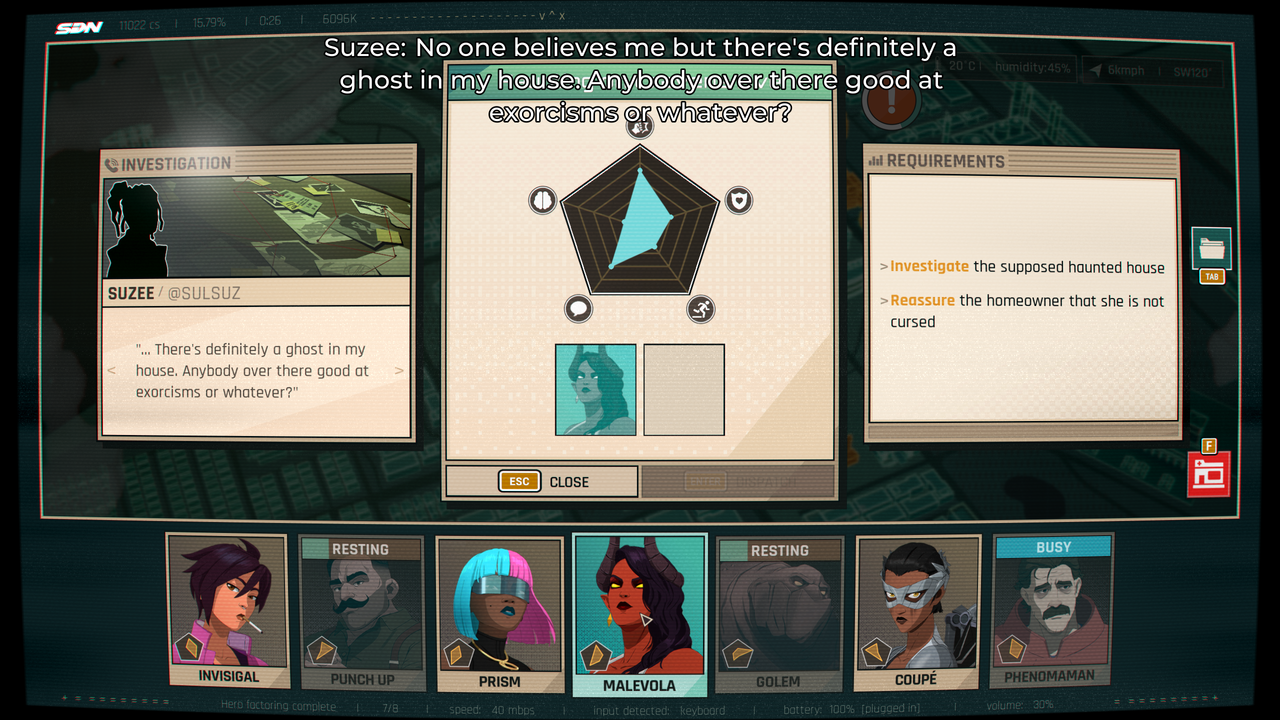
What makes it more engaging is how closely it ties into the narrative. Every new mechanic introduced has a narrative purpose. The banter between the Z-Team during these sections and reactions to the absurd scenarios are also hilarious. The game does an excellent job balancing system depth with accessibility, ensuring the gameplay grows alongside the story steadily without overwhelming the player.
Gameplay – Hacking & QTEs
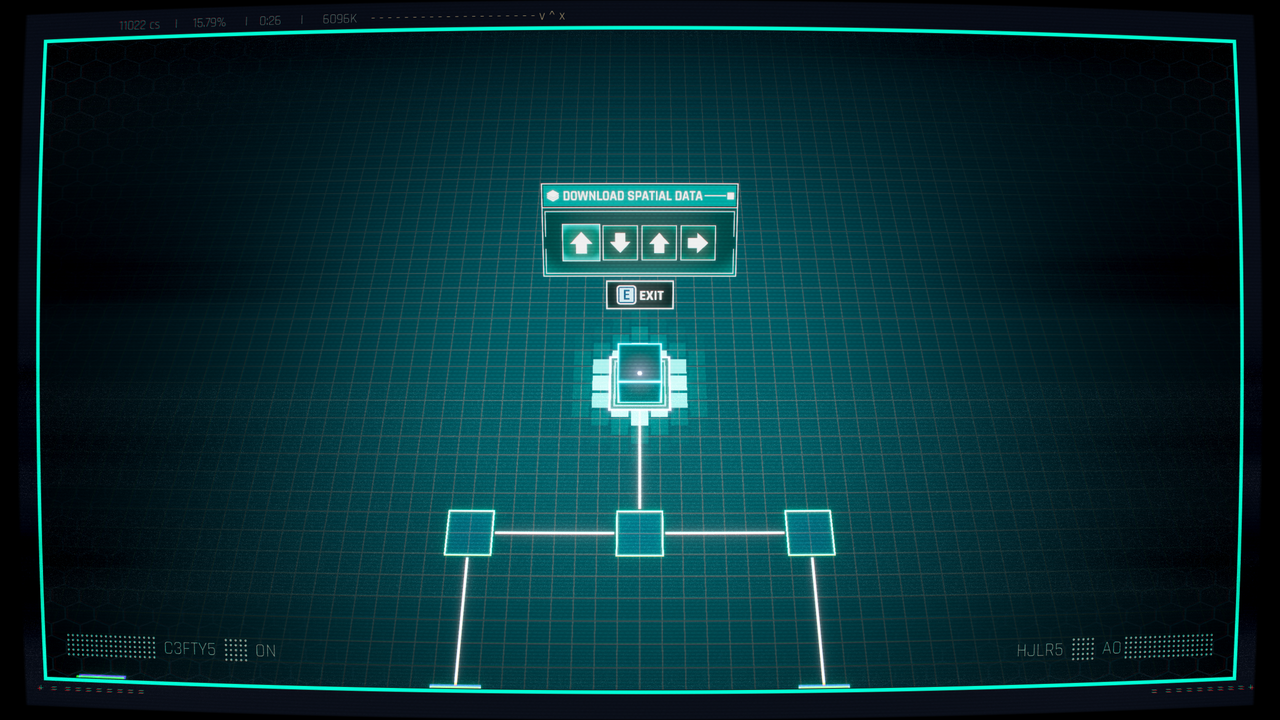
In addition to dispatch management, the game features hacking sequences and quick-time events. The hacking sections are effective and thematic, usually tied into high-stakes story moments where Robert must intervene to assist a Z-Team member digitally rather than with physical force. They’re simple but intuitive, engaging, and surprisingly challenging in later episodes. They are quick and avoid overstaying their welcome, but they’re usually impactful, especially since a failure could change how a narrative section unfolds.
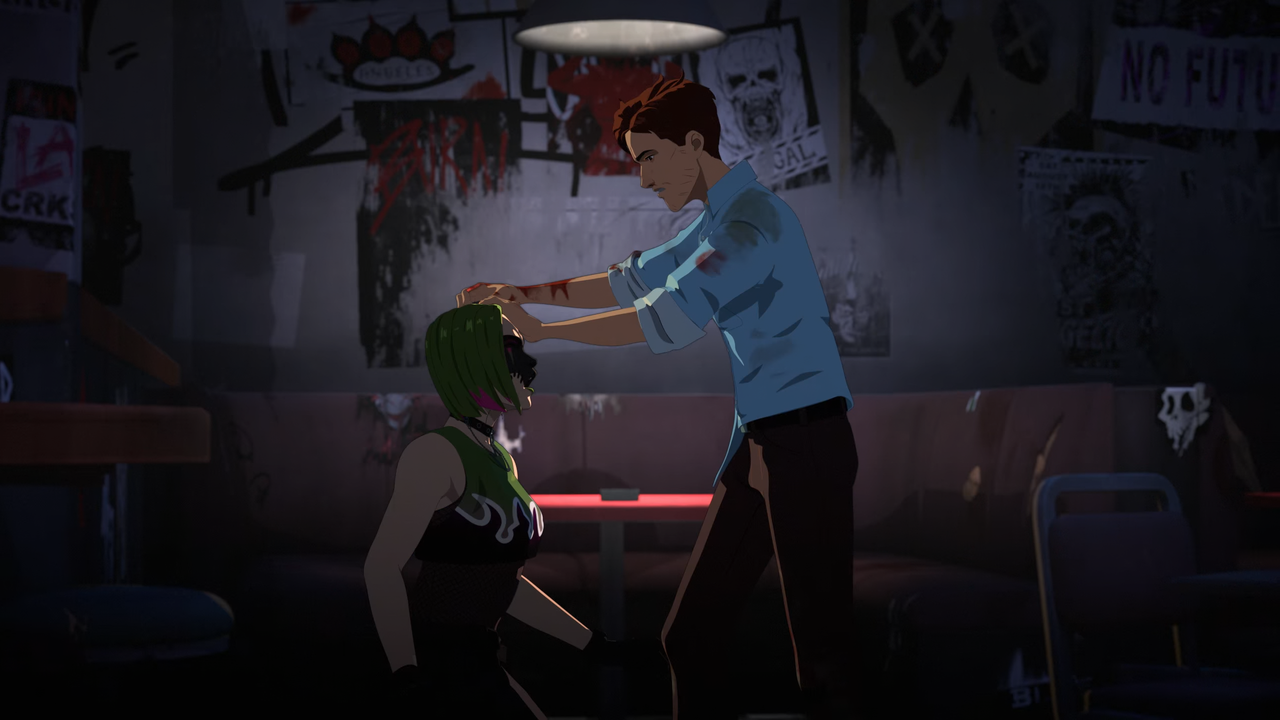
The QTEs, however, feel like unnecessary padding, which is probably why they’re completely optional. They are sparsely shoved into scenes to add forced interactivity, but the timing is so forgiving that they lack any real tension. You can realistically just button mash A and never fail 70% of the prompts. While they slightly increase engagement during cutscenes, they feel like a mechanic included out of obligation rather than necessity. In a game built around smarter forms of interactivity, they stand out as its weakest design element.
Final Verdict
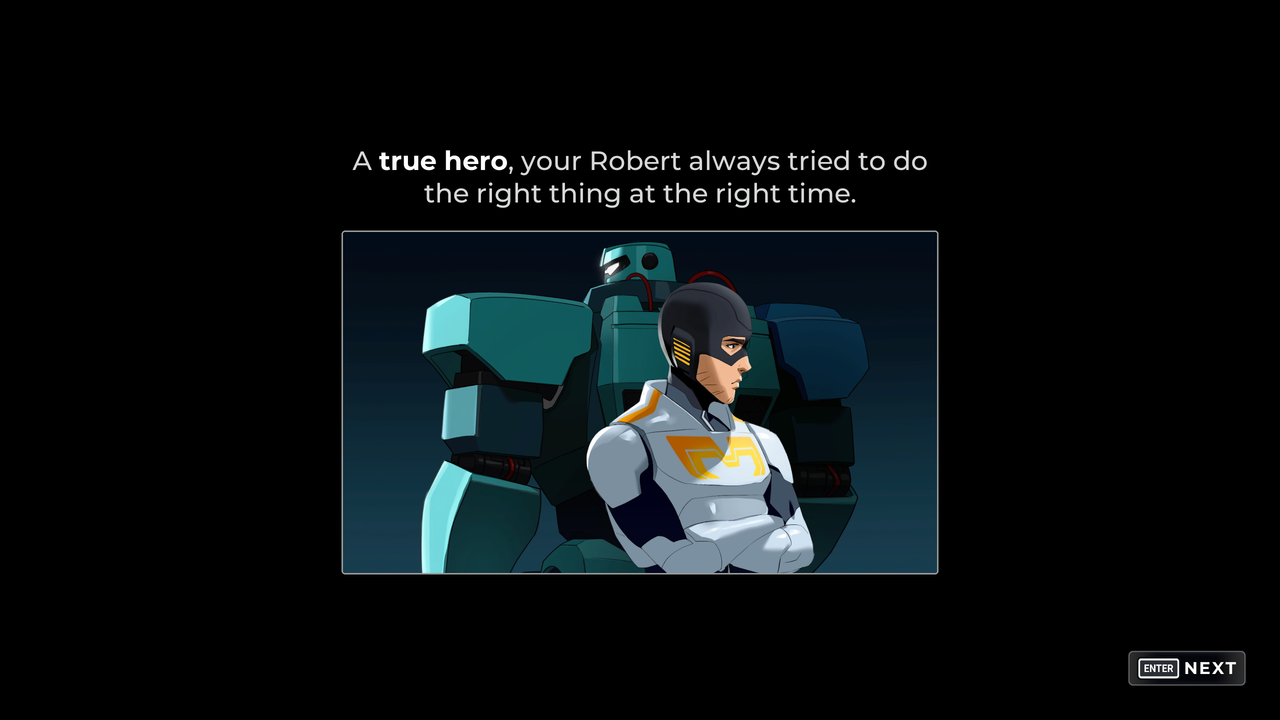
Adhoc Studio crafts a superhero masterpiece that redefines the genre, thrusting you into the high-stakes world of dispatch management while delivering an emotional rollercoaster of redemption, raunchy humor, and heartfelt bonds. Across its eight gripping episodes, the game masterfully blends razor-sharp writing, a Spider-Verse-inspired visual feast, unforgettable voice acting from stars like Aaron Paul and Laura Bailey, and addictive strategic gameplay that evolves without ever frustrating. Robert Robertson, the SDN members, and the Z-Team’s ragtag charm steal your heart, turning this chaotic cast into family through choices that shape relationships and finales.
Dispatch is a triumphant debut from Adhoc Studio, echoing its own themes of second chances. Minor gripes like unnecessary QTEs and light narrative branching can’t dim its brilliance—this is narrative-driven excellence at its peak. It isn’t flawless, but it’s profoundly human, laugh-out-loud funny, and surprisingly emotional. It’s one of 2025’s absolute must-plays for every type of gamer and will be heralded as a redemption of the dwindling genre for years to come.
Final Score: 9.5 / 10
This game was purchased by the reviewer.
Pros
- Outstanding character writing and performances
- Unique, evolving dispatch and hacking gameplay
- Distinct and striking art direction
- A Hollywood-perfect “good ending”
- Excellent soundtrack that’s utilized well
- Equally great romance options
Cons
- QTEs feel low-effort and unnecessary
- Choices could’ve had deeper changes and consequences

